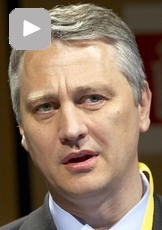Hospitals and Cost Management
Cultural differences in healthcare delivery across borders and the effects on cost structure
No more healthcare myopia! Although Szabolcs Dorotovics, MD MBA and Managing Director for Global Ventures at Johns Hopkins Medicine International, Baltimore, USA, is not an ophthalmologist, he urged the HMS audience to put on their specs and look beyond institutional, national and cultural borders and boundaries.

“With the globalisation of healthcare we learn more and more about substantially different setups, methods and systems that are working well in other parts of the world. Such practices are frequently dismissed as working only in the particular healthcare culture and environment. Nevertheless, some highly successful models are worth to be evaluated by any hospital managers,” Dorotovics said in his presentation on the cultural differences in healthcare delivery across boarders and the effects on hospital cost structure.
“Medical care in inpatient healthcare facilities – or hospitals – is delivered to patients in every country. While the fundamentals of the process are similar everywhere, many differences may be observed due to multiple factors: the variations in healthcare culture, regulatory environment, funding levels, the expectations of funding sources, and in the expectations of patients (and/or referring doctors) determine – to a great extent – how the systems and procedures are set up in hospitals. These factors are mostly outside of hospitals’ direct control, although may be influenced by them.
The tools hospitals have to improve their operational effectiveness and quality of care are mainly limited to the management of their own resources and processes. Hospital managers, when looking for specific solutions or best practices, usually limit their research to the local or regional hospital community.” Some of the local approaches that met with international interest in globalised healthcare are for example the extension of the role of nurses, the increase of operational transparency, or implementation of patient safety systems. “To improve care processes management and patient safety in your hospital” Dorotovics pointed out, “you need transparent performance data, permanent collaboration among professionals – meaning physicians, nurses and administrator – and most of all: your nurses need to take up new roles. Make them care managers who ensure appropriate care. Make them safety officers by giving them the right to stop the doctor if he is doing a mistake, e.g. in hygiene management. It will pay off.”
“The role of the patient and family is getting more and more powerful in the interaction of healthcare: With the appearance of the internet, people are informing themselves a lot through this medium. The internet influences their choice of provider and creates a demand for transparency as well as a request for specific treatment and care options,” Dr Dorotovics said. “This leads to the phenomenon that people start to self diagnose themselves which can be a very dangerous development on occasions but that’s the way it works today and we have to deal with it.”
Dorotovics has over 15 years’ experience in strategic positioning, business development and enterprise management in the global healthcare delivery arena. He is a seasoned healthcare leader who has brought numerous healthcare projects to operational and financial success in multiple countries. He has obtained a thorough understanding of multiple healthcare systems and built a large personal relationship network with healthcare executives, corporate leaders and top government officials in Europe, Asia and also in Latin America.
Prof. Debatin is not only a renowned lecturer, but also a recognised expert and strategist for hospital management. For four years, Debatin was Professor and Chairman of the Dept. of Diagnostic and Interventional Radiology at the University Hospital Essen. Since 2003 he has been Professor and Medical Director as well as Chief Executive Officer at the University Medical Centre Hamburg-Eppendorf (UKE). Under his leadership, UKE has developed several innovative approaches to increase medical quality, scientific performance and profitability.
12.04.2010





